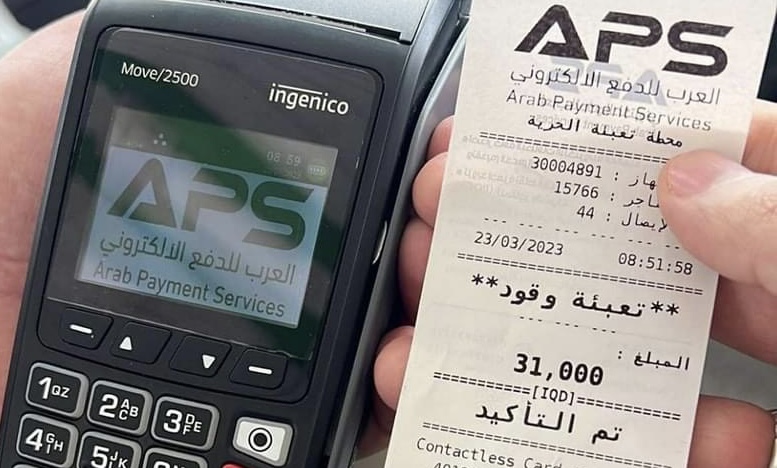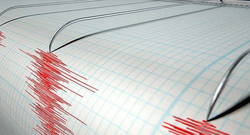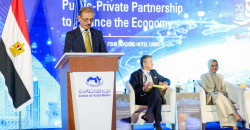From Cash to Cards: Workers' struggle, electronic payment prospects, and Iraq's shift to a cashless future

Shafaq News/ In Iraq, the push towards electronic payment systems has encountered resistance from many workers who fear the impact on their livelihoods.
As the Government aims to phase out cash transactions and implement modern automation, concerns arise among citizens, especially those working in gas stations.
The Iraqi Ministry of Oil's Products Distribution Company has set the end of next March as the final date for cash transactions at government and private fuel stations. The first trial took place this week at the Muthanna government station.
In a statement, the Company's general manager, Hussein Talib, explained to Shafaq News Agency that "companies have connected fuel dispensers to Point-of-sale (POS) terminals (hardware systems for processing card payments at retail locations,) allowing citizens to enter fuel quantities and make payments without the need for human intervention."
The nightmare of unemployment
Fuel station worker Mohamed Ali, 33, believes that the electronic payment device placed next to him is the main reason for a decline in the tips he receives, and he may even lose his job as citizens increasingly use Visa cards to purchase fuel.
Ali, who has been working at a gas station in Baghdad for nine years, told our Agency, "I spend most of my time, from dawn to dusk, standing near this cabinet to serve those who want to refuel. They usually give me some tips for every refill, but now the tips are falling due to electronic payment systems."
Ali sees electronic payment systems as threatening his livelihood, "The situation doesn't look good, especially for those working at gas stations. Owners are talking about the possibility of reducing the number of workers, which will lead to increased unemployment, given the lack of new hires and limited job opportunities in other sectors."
Advantages of electronic payment
Electronic payment, a system for settling transactions without cash, has numerous advantages. One of the most significant benefits in Iraq is eliminating corruption, fraud, and direct bribery in government institutions. It also facilitates ease of transactions and increases cash deposits in banks and financial institutions.
However, the transition to this globally practiced system in Iraq is not without fraudulent activities that could occur both by merchants during citizens' transactions and through the imposition of additional fees under the pretext of current deduction charges, especially as the societal culture regarding electronic payment is weak.
Therefore, economy experts stressed the necessity to educate the community about using electronic payment and facilitating the opening of bank accounts for citizens to obtain electronic cards smoothly and without obstacles.
In this context, oil expert Govand Sherwani states, "The electronic card payment and billing system represents a modern approach to financial transactions, characterized by speed and accuracy. It reduces reliance on cash liquidity, which is usually susceptible to damage and requires compensation."
Sherwani adds, "Card transactions reduce dependence on currency, whether paper or cash, thereby reducing losses and saving additional funds for the state. The payment system provides a secure way to conduct financial transactions instead of carrying large amounts of cash in the wallet, which may be prone to loss or theft."
However, the challenges hindering the implementation of this system in Iraq may be, according to Sherwani, "the lack of adaptation by ordinary citizens, especially those with limited education or self-employed individuals, as well as the fees imposed on every purchase or sale using these cards."
He calls for "keeping the commission low to incentivize citizens to adopt the cards without hindrance, as card adoption is a preliminary step towards electronic banking without the need to visit the bank and deal with paper currencies, whether for withdrawals or deposits."
"Getting used to these cards will be a preparatory step for citizens who are not accustomed to visiting banks to open accounts, conduct commercial transactions, and even receive salaries, as mentioned in the smart card and key card, electronically transferring salaries to any point or agency for the key card anywhere in Iraq."
Sherwani notes that "employees are accustomed to this system, but non-employees, such as self-employed and traders, may find this new. However, with time, they will realize the benefits of electronic payment."
On the fate of workers at gas stations, Member of the Iraqi Parliament's Oil and Gas Committee, Deputy Kazem Jaru Al-Maghsoub, states that "in most Government and private gas stations, the worker takes an additional amount for himself (tips). Therefore, electronic payment will put an end to this."
"Putting money in the MasterCard will transfer the funds from the citizen's wallet to the state's balance. Therefore, electronic payment has many benefits and will reduce corruption." He told Shafaq News.
Regarding the future of workers at the stations, he assures that "they will continue working and will not be affected. Perhaps their numbers in the sales department may decrease due to the availability of payment devices that perform their tasks, and the surplus will be distributed to the Oil Product Distribution Company, so the payment devices will not cause unemployment. However, workers in private stations may be affected due to the availability of devices that perform their roles, reducing their numbers."
On the other hand, Deputy Chairman of the Union of Gas Filling and Services Facilities, Abbas Mahioub, points out that "most citizens do not have a Visa card, and in my work, there is a problem in the gas-selling process. The gas agent who roams within cities to sell gas to citizens finds that most people do not have electronic payment cards."
Mahioub adds to Shafaq News, "Although the Visa card is available, it has a commission when charging and withdrawing, which is a loss for the cardholder. Despite the system's many benefits, these commissions may lead to price increases to cover these fees."
Providing POS devices in public places
Despite the directives of the Iraqi Government to implement the electronic payment system in state institutions, the private sector, commercial centers, markets, and other entertainment facilities, most markets and fuel stations lack POS devices.
It's worth noting that the Central Bank of Iraq's Board decided on December 13 last year to establish the "National Company for Electronic Payment Systems" nationwide.
According to the Central Bank, this step comes in parallel with the rapid growth in electronic financial services and products and the increasing number of users, aligning with the Government's program to support and adopt advanced electronic payment systems.
Additionally, the Iraqi Banks Association revealed, on December 12, a growth in bank accounts, bank cards, and electronic payment devices following the significant support provided by Prime Minister Mustafa Al-Kadhimi and the Central Bank of Iraq to the banking sector. This support included activating electronic payment in government and private institutions and reforming mechanisms for financing foreign trade.
The Board's chairman, Ali Tariq, stated in a press release that bank accounts grew by 14%, reaching 10.02 million by the end of September 2023, compared to about 8.79 million accounts at the end of 2022, which indicates the creation of more than 1.2 million accounts within nine months.
Iraq's shift from cash to electronic payments poses both challenges and opportunities. Workers like Mohamed Ali face uncertainties, yet the potential benefits of reducing corruption and improving efficiency are significant.
Therefore, the success of this financial evolution lies in embracing technology while safeguarding the workforce's well-being, striking a harmonious balance between progress and empathy.





